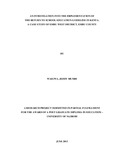| dc.description.abstract | The Return to School education guideline that provides a chance to girls and young mothers who
for some reason find themselves pregnant while in school. The research objectives were:- To
investigate if school administrators, teachers and headteachers are familiar with the Return to
School education guideline; To investigate if the Return to School education guideline is
currently being implemented; To investigate if there are any challenges experienced in the
process of implementing the Return to School education guideline and To elicit views on the
Return to School education guideline. The researcher used sampling method. The researcher
assembled, classified, edited and arranged the data collected. The researcher also thoroughly
checked the data for completeness, consistency, accuracy and uniformity. Thereafter, the data
was analyzed quantitatively and qualitatively. The analyzed data was presented using the charts,
tabulations and graphs.
From the data analysis and presentation:- it is clear that there is need for the return to school
education guideline. Cultural practices, female genital mutilation, early marriages, poverty, child
labour, finances, diseases especially HIV and AIDS play some influence on the implementation
of the guideline. However, infrastructure seemed not to play any role in the implementation of
the guideline.
From the findings:- 60% of the respondents have an idea about the implementation of the return
to school education guideline whether formerly or informally. Cultural practices have an
influence on the implementation of a guideline. 73.3% believe that female genital mutilation
plays a role the implementation of the return to school education guideline. Poverty that affects
most families in Kenya also influences the implementation of the return to school education
guideline in Kenya according to 86.6% of the respondents. 100% of the respondents believe
diseases have a role to play in the implementation of the return to school education policy. 15
and 8 of the respondents say that HIV and AIDS and other lifestyle diseases play a role in the
implementation of the guideline respectively. The guideline would be a reprieve to students.
The Return to School Education Guideline is an important and positive effect in the life of the
girl child and her education and therefore highly recommended. | en |

